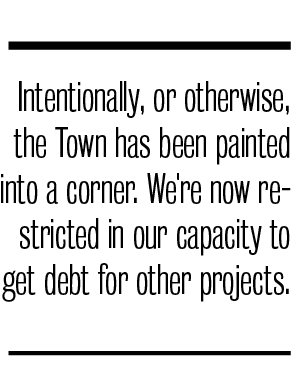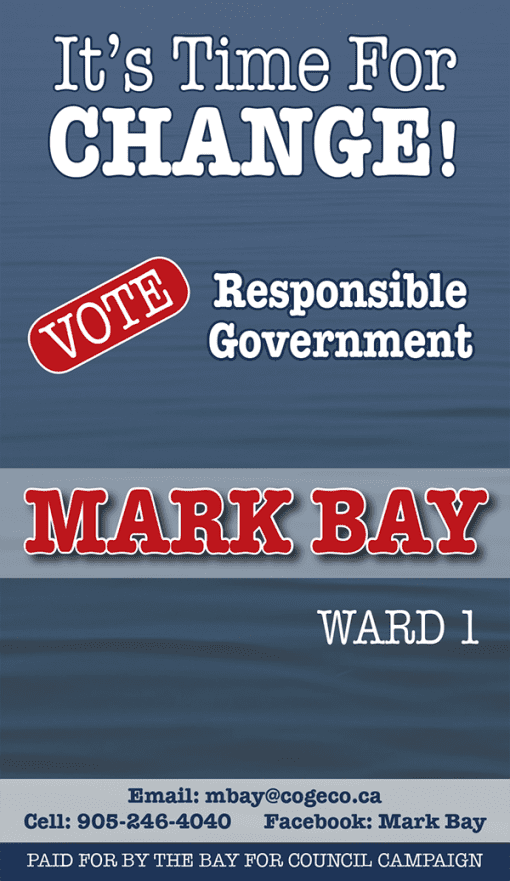Wally Braun says that it's time to stop playing into the hands of developers
BY JOHN SWART VOICE Correspondent
Ward 2 council candidate Wally Braun has a question: How is it happening?
"[Rather than developers] we need to have taxpayers and local citizens benefit from the conversion of [Town] property from one zoning to another. Right now we get nothing from the consideration of the fact that Council does developers this huge favour of creating these gross margins. In fact, we get saddled with a $9 million, 30-year debenture for that privilege. How is that happening?"
Braun does not favour the status quo and wants the present council replaced. He would press for an audit that goes back 20 years and includes resident participation. It would look outside normal parameters, to relationships between past councils and developers, to how and why the Town acquires land, and how changes in zoning are timed and accomplished.
 With respect to a forensic audit, Braun's first order of business would be to release former employees from their non-disclosure agreements and solicit whatever information they can give as to what happened.
With respect to a forensic audit, Braun's first order of business would be to release former employees from their non-disclosure agreements and solicit whatever information they can give as to what happened.
Braun explains, "I think an audit that went back at least a decade would substantiate some of the things I'm trying to lay out here. The larger picture is that public assets are transferred into private hands at the same time council historically changes the zoning on a parcel before making a purchase of that parcel. Why is that? Is that in the interest of voters? Why not pick up a parcel at agricultural prices and then change the zoning?"
Braun has been paying attention to property transactions in Pelham for 35 years, and ran for council in 2003 and 2014. He cites Davis Hall as an example that was mishandled years ago. He toured Davis Hall before it was sold, and believes there was nothing wrong with the building, much as there is nothing wrong, in his estimation, with the Haist Street arena.
"You just have to maintain it," says Braun. "The commonality across the board is that public assets are being transferred into private hands at fire-sale prices."
He makes no accusations, only asks questions, and compares what has happened as Pelham has grown to other communities.
He asserts, via research done while attending Brock University in the mid-2000s, that there is a verifiable relationship between campaign contributions by developers to candidates that is inversely proportional to the strength of land conservancy within a municipality.
If land is not protected for the benefit of residents, developers will increase campaign contributions with the hope of influencing zoning to their advantage.
 Braun says there was no mandate for the newly constructed community centre. The $35 million dollar budget to build it was arrived at by floating trial balloons of $5 million dollar increments until the community pushed back. This approach concerns him.
Braun says there was no mandate for the newly constructed community centre. The $35 million dollar budget to build it was arrived at by floating trial balloons of $5 million dollar increments until the community pushed back. This approach concerns him.
"Intentionally, or otherwise, the Town has been painted into a corner. We're now restricted in our capacity to get debt for other projects. Intentionally or otherwise, this aligns the Town's interest with developers' interests. We need to find tax revenues, and if you look at the business plan, for how the Town is going to go about paying for the community centre, it does involve future revenues from new development," says Braun.
"We're finding now an additional 150 acres will be developed too soon [in order] to address debt issues. To avoid increasing taxes, future councils will be forced to increase the rate of development, which is what developers want."
Braun questions how this situation came about.
"Is it possible that the powers that be behind the scenes have orchestrated things so that this is now the position we find ourselves in?"
He goes on.
"Continue connecting the dots. The previous arena was placed where? At the foot of Haist Street, when the entire tract of land west of Haist Street was being developed. It may not be illegal, but it is in effect bonusing the developer, in that the lots they subsequently sell are worth more by way of the fact that they are adjacent to a public facility that we, as taxpayers, end up paying the tab for. This supports my theory that public buildings are placed in areas advantageous to the development community."
“Bonusing,” or offering municipal incentives to corporations, including land developers, is illegal in Ontario. Critics have charged that some of the Town’s real estate transactions in East Fonthill have resembled bonusing, allegations that the Town has denied.
Ongoing operating costs of the community centre are a concern for Braun, and he suggests that user groups provide volunteers to help offset the cost of salaries. He believes that many user groups made this commitment prior to the decision to build the centre.
Braun's solution to the Town's indebtedness is twofold. He proposes a Town Land Bank, funded by converting part of the Town's financial reserves into agricultural and forest land, purchased at the lower prices agricultural zoning commands.
He would then put a conservancy on them, perhaps using them for parks and recreation in the meantime. In this manner, when the property appreciates and is eventually sold, all taxpayers can benefit.
 Braun suggests that had a plan like this been in place years ago, it could have compensated for the loss of the arena land. He feels it's clear that the arena lands will be sold because the Town needs the money, and it was part of the strategy to fund the new centre.
Braun suggests that had a plan like this been in place years ago, it could have compensated for the loss of the arena land. He feels it's clear that the arena lands will be sold because the Town needs the money, and it was part of the strategy to fund the new centre.
Secondly, he would suggest rather than building sideways, with typical sprawl, a more reasonable approach is to build up.
"That does not mean that we need anything more than five stories. There should be hard cap at five stories," Braun emphasizes. "More than that is out of place."
Braun states that provincial legislation is worded such that eight stories is a threshold.
"Once you have eight stories approved, and meet a minimum density, [then] stopping developers from going to 10 or 12 stories is out of the municipality's control. That actively bonuses developers to go to 10, and 12 stories."
One of the additional costs this adds to the Town, Braun points out, is that to protect the residents of a 10-story building already approved by council in East Fonthill, the fire department will have to buy a more expensive ladder truck.
Braun questions why there has been so much turnover in the Planning and Development Department, and more recently in the Corporate Services Department, and why it it occurred as the Town faced development consequences.
"I don't know what that connection is, for sure, but voters might be forgiven for believing that the reason for such a high rate of turnover was because these people were trying to alert council to the dangers of rapid development.”
Braun names a former planner who was terminated by Pelham and now works in a different Niagara municipality. Braun asserts that the staffer “leaked” a document that demonstrated “the inversion of power relations” between a Toronto-based development company and Pelham Town Council. Braun says that the developer “had got all the options and could impose upon the Town what it was that it wanted. It was explicit in that document. I think the reason [the staffer] leaked that document was to alert people to what was going on."
The former planning official, who later brought a code-of-conduct complaint against Town Council and is bound by a non-disclosure agreement, says that Braun’s characterization isn’t entirely accurate.
“’Leaked’ would be incorrect,” says the former staffer, whom the Voice has chosen not to identify. “While I understand what Mr Braun is implying, I am baffled by his accusation that I issued some correspondence.”
 Were he elected, Braun would push for conflict-of-interest declarations being a condition of employment for senior Town staff as well as councillors, and create a means for the public to have direct input during council meetings.
Were he elected, Braun would push for conflict-of-interest declarations being a condition of employment for senior Town staff as well as councillors, and create a means for the public to have direct input during council meetings.
Braun enjoys campaigning, and getting to know the variety of perspectives held by Pelham voters. He is impressed with the “calibre of electorate.”
“People know how to read, they're very smart. You should not really be afraid of pitching over their head. It's not just right-wing, left wing. They pick and choose, the hybrids that come up are quite interesting."
Braun has been a professional in general contracting since his teens, with a special interest in architectural design. Being part of an ad hoc committee instrumental in keeping billboards out of Pelham was an important volunteer effort, as was time he spent with the Local Architectural Conservation Advisory Committee and the Pelham Historical Committee.
Braun is still finding out what the Ward 2 community wants regarding Airbnbs and short-term rentals. He acknowledges vocal individuals have provided strident input, and wants to see if their opinions are shared. If so, communities within Pelham may have to be differentiated on that policy.
"If they don't want them in that neighbourhood, we are obliged to honour that," says Braun.
Braun also believes—assuming it is something the community might consider—that regulating Airbnbs leaves the door open to generating revenue. He believes Airbnbs would effectively be converted to B&Bs by requiring owners to be on site. Braun doesn't want a situation where outside money buys units for speculation, then installs renters to pay the bills, and wonders if insisting upon of owner-occupancy might resolve the vast majority of complaints.
This is consistent with provincial regulation on secondary suites, where on-site owners are mandated.
Braun sees more mixed-use zoning, allowing commercial on the ground floor and housing above, as a way to provide more affordable housing without sacrificing green space.
"Since the GoTrain has connected us to Toronto, home prices have exploded to where old people and young people are equally disadvantaged, and we need to find ways to accommodate them. What we have now is an historic core that is being compromised by four story buildings, not in character for our downtown. Conversely, we have a commercial strip that's one story. What we need is to invert that. We need to preserve our downtown cores and instead develop multi-story mixed-use zoning in areas like Highway 20.”
Braun is a strong advocate for public transit, regularly using our local system himself, which he calls a good first step. He says the key to its success in Pelham is to ensure connectivity, within and outside Pelham. He would also consider a trans-cab service to lower costs by replacing scheduled service on under-utilized routes with a call-up system that aggregates rides. A rideshare system managed electronically by the Town could be investigated too.
As the election nears, if you don't see Braun's lawn signs, it's by his choice.
"They give voters no information, they are sophomoric, reflecting a high school popularity contest rather than any worthwhile information," he argues.
Status quo, Braun is not. ♦
RELATED: 2018 candidate interviews
RELATED: Which ward do I live in? While you're here...consider taking out a Voice Membership to express your support of local journalism.


